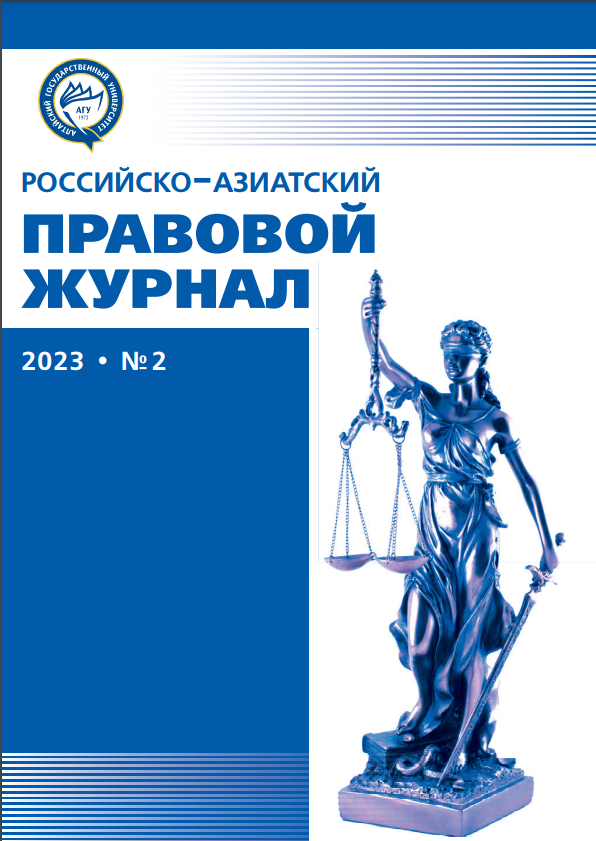THE SYSTEM OF FUNCTIONS AS THE BASIS OF THE CONCEPT OF THE FEDERAL MINISTRY
УДК 342.518 ББК 67.401.011
Abstract
The effectiveness of public administration depends on the sustainable development of the system offederal executive authorities, in which the key role is assigned to federal ministries. At the same time, there isno unity in the understanding of the federal Ministry in the legal literature. Accordingly, the article exploresthe theoretical, historical, and legal foundations of the formation of the concept of a federal ministry, whichallow us to talk about changing the vector of building the system of federal executive authorities since 2004in order to optimally restructure it in the event of emergency. The analysis of the current regulatory legalacts defining the essence and content of the organization and functioning of federal ministries is carried out.The author suggests in the definition of the concept of the federal ministry to be based on the functionalprinciple enshrined in the current regulatory legal acts. There are «basic» functions characteristic of allfederal ministries and «additional» functions provided to certain federal ministries in accordance withregulatory acts. The conclusion is made about the understanding of the federal Ministry as a centralizedfederal executive body endowed with appropriate functions.
Downloads
References
Замолоцких Ю.Н. Межведомственное взаимодействие органов исполнительной власти в Российской Федерации: Теория, практика, перспективы развития : автореф. дис. … канд. юрид. наук. Воронеж, 2019.
Спиридонов П.Е. Современные вопросы развития системы федеральных органов исполнительной власти // Вестник ун-та им. О.Е. Кутафина. 2019. N 6. C. 96–103.
Бахрах Д.Н., Россинский Б.В., Старилов Ю.Н. Административное право : учебник. М., 2008.
Общее административное право : учебник: в 2 ч. / под общ. ред. Ю.Н. Старилова. Воронеж, 2016.
Тихомиров Ю.А. Курс административного права и процесса. М., 1998.
Словарь иностранных слов. М., 1989.
Ожегов С.И. Словарь русского языка М., 1989.
О системе федеральных органов исполнительной власти : Указ Президента РФ от 14 августа 1996 г. N 1176 (в редакции от 6 сентября 1996 г.) // СЗ РФ. 1996. N 34. Ст. 4081.
Ерошкин Н.П. История государственных учреждений дореволюционной России : учебник для студентов высших учебных заведений по специальности «Историко-архивоведение». М., 1983.
Высочайший манифест об учреждении Министерств от 8 сентября 1802 г. URL: https://unikdoc.rusarchives.ru/0806-manifest-ob-uchrezhdenii-ministerstv (дата обращения: 21.01.2023).
О системе и структуре федеральных органов исполнительной власти : Указ Президента РФ от 9 марта 2004 N 314 (в ред. от 20 ноября 2020 г. №719) // СЗ РФ. 2004. N 11. Ст. 945.
Положение о Министерстве экономического развития РФ : Постановление правительства от 5 июня 2008 г. N 437 (в редакции от 20 октября 2022 г. №1864) // СЗ РФ. 2008. №24. Ст. 2867.
Положение о Министерстве энергетики РФ : Постановление Правительства РФ от 28 мая 2008 г. N 400 (с изменениями от 26 октября 2022 г. №1901) // СЗ РФ. 2008. N 22. Ст. 2577.
Положение о Министерстве внутренних дел РФ : Указ Президента РФ от 21 декабря 2016 г. N 699 (с изменениями от 30 сентября 2022 г. №688) // СЗ РФ. 2016. N 52. Ст. 7614.
Положение о Министерстве обороны РФ : Указ Президента РФ от 16 августа 2004 г. N 1082 (с изменениями от 4 мая 2022 г. №259) // СЗ РФ. 2004. N 34. Ст. 3538.
Положение о Министерстве финансов РФ : Постановление Правительства РФ от 30 июня 2004 г. N 329 (с изменениями от 22 сентября 2022 г. №1673) // СЗ РФ. 2004. N 31. Ст. 3258.
Положение о Министерстве труда и социальной защиты РФ : Постановление Правительства РФ от 19 июня 2012 г. №610 (с изменениями от 10 января 2023 г. №2) // СЗ РФ. 2012. №26. Ст. 3528.
Положение о Министерстве юстиции РФ : Указ Президента РФ от 13 октября 2004 г. N 1313 (с изменениями от 18 июля 2020 г. №469) // СЗ РФ. 2004. N 42. Ст. 4108.
Положение о Министерстве иностранных дел РФ : Указ Президента РФ от 11 июля 2004 г. N 865 (с изменениями от 20 мая 2022 г. №295) // СЗ РФ. 2004. N 28. Ст. 2880.
Russian-Asian Law Journal is a golden publisher, as we allow self-archiving, but most importantly we are fully transparent about your rights.
Authors may present and discuss their findings ahead of publication: at scientific conferences, on preprint servers, in public databases, and in blogs, wikis, tweets, and other informal communication channels.
Russian-Asian Law Journal allows authors to deposit manuscripts (currently under review or those for intended submission) in non-commercial, pre-print servers such as ArXiv.
Authors who publish with this journal agree to the following terms:
- Authors retain copyright and grant the journal right of first publication with the work simultaneously licensed under a Creative Commons Attribution License that allows others to share the work with an acknowledgement of the work's authorship and initial publication in this journal.
- Authors are able to enter into separate, additional contractual arrangements for the non-exclusive distribution of the journal's published version of the work (e.g., post it to an institutional repository or publish it in a book), with an acknowledgement of its initial publication in this journal.
- Authors are permitted and encouraged to post their work online (e.g., in institutional repositories or on their website) prior to and during the submission process, as it can lead to productive exchanges, as well as earlier and greater citation of published work (See The Effect of Open Access).








